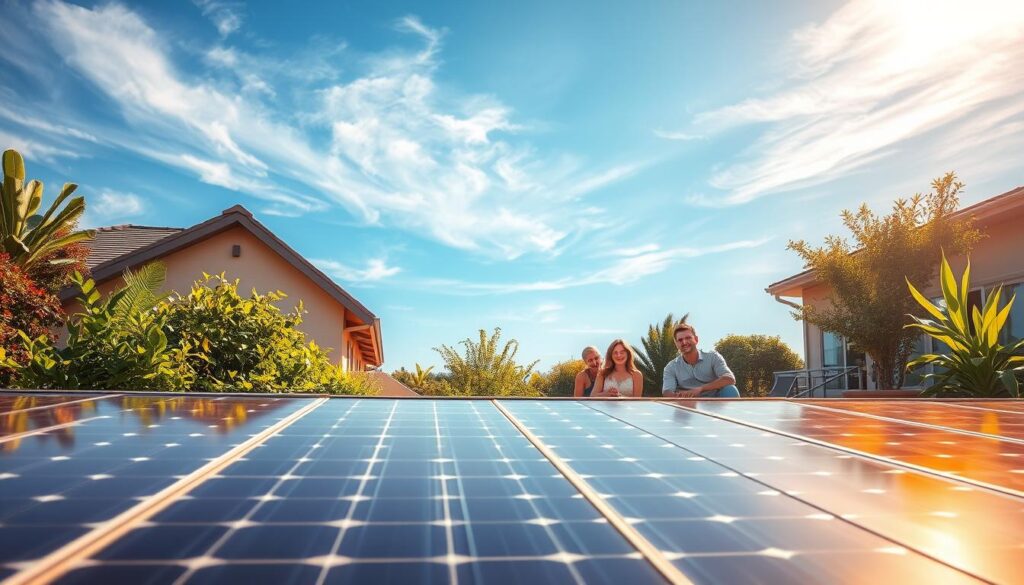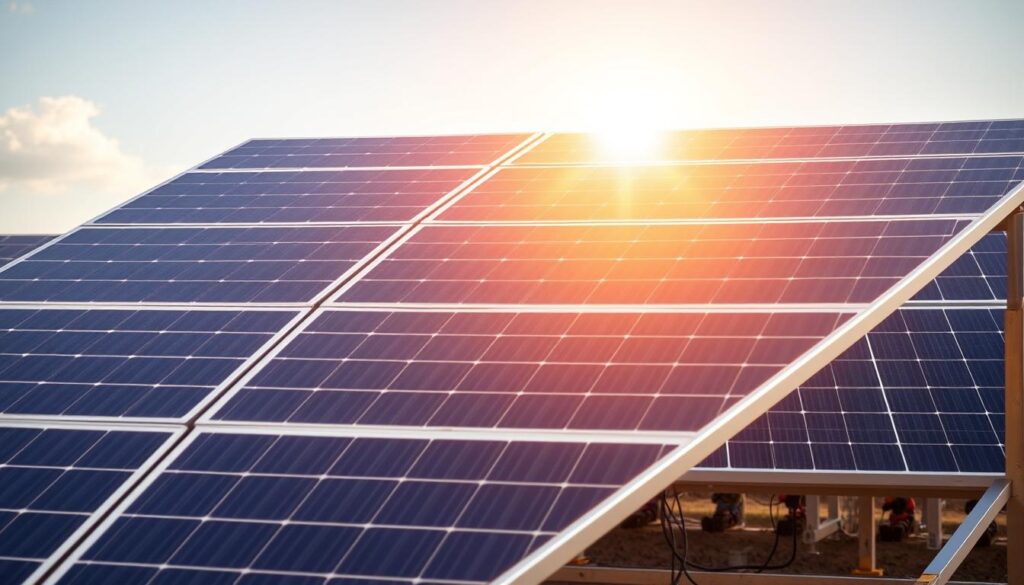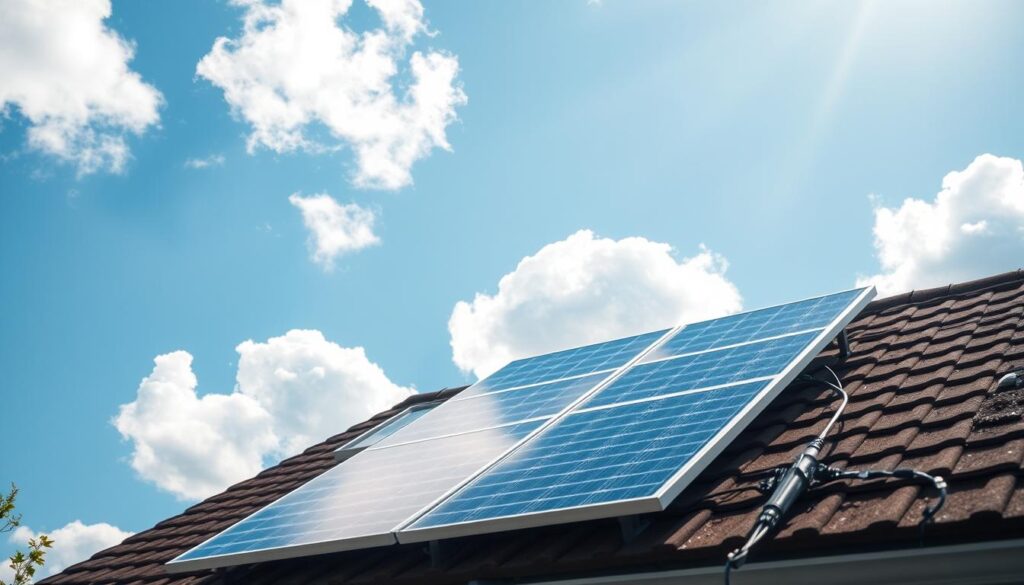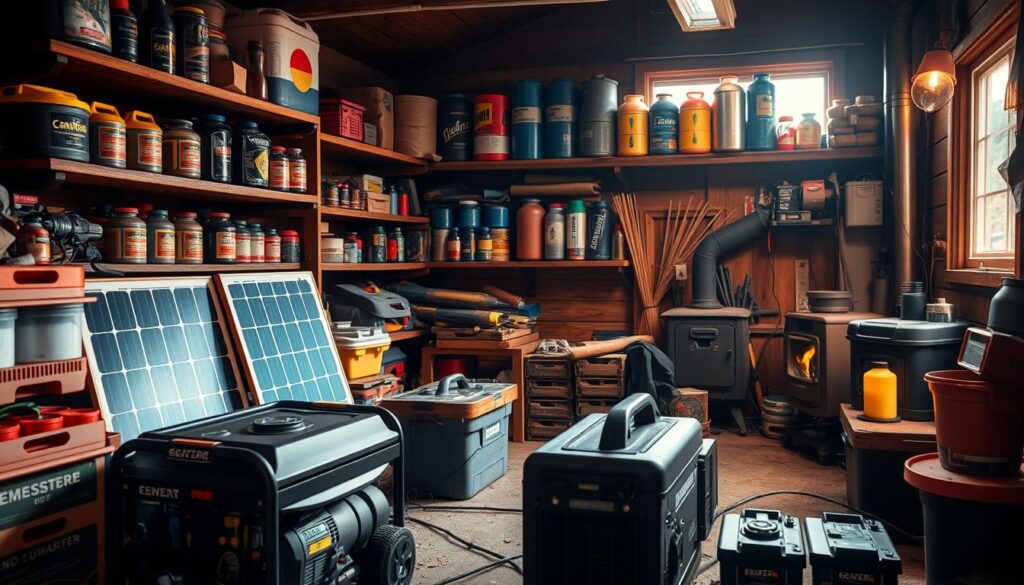I’m starting a journey towards a greener lifestyle, and I’ve learned how crucial renewable energy is. Using the sun’s power is a key step to break free from old energy sources. It’s an exciting move towards a cleaner, more sustainable life.
By making our own clean energy, we cut down our carbon footprint a lot. I’ve seen that solar energy is good for the planet and saves money too. In this guide, I’ll show you how to set up a solar panel system. We’ll explore the benefits and the steps to take.
Key Takeaways
- Reduce reliance on traditional energy sources
- Lower carbon footprint
- Save money with clean energy
- Gain energy freedom
- Adopt a cleaner lifestyle
Why I Chose Solar Panels for My Home
I started looking into solar energy because of its many benefits. It saves money and helps the environment. Solar panels are a great choice for those wanting to use less traditional energy.
Benefits of Solar Energy
Solar energy is clean and renewable. It uses sunlight to power homes, reducing our need for fossil fuels. This cuts down on harmful emissions.
The benefits of solar panels also include saving money and gaining energy independence. Plus, they can make your home more valuable.

Environmental Impact
Solar energy is better for the environment than traditional energy. Solar panels don’t pollute or produce emissions. They help reduce air pollution and fight climate change.
Financial Savings
Financial savings are a big reason to get solar panels. They might cost a lot at first, but save a lot of money later. There are also tax credits and rebates to help pay for them.
Knowing the financial benefits and environmental perks of solar panels helps homeowners decide. It’s a smart move for saving money and helping the planet.
Understanding How Solar Panels Work
To use the sun’s power well, we need to know how solar panels work. These panels are complex systems that turn sunlight into electricity. They have several important parts.
Photovoltaic Cells
At the core of solar panels are photovoltaic cells. They change sunlight into direct current (DC) electricity. This happens because sunlight makes electrons in the cells move, creating DC electricity.
The photovoltaic effect is a detailed process. It happens when sunlight meets the special materials in photovoltaic cells. This meeting creates an electric current.

Inverter Functionality
Photovoltaic cells make DC electricity, but we need alternating current (AC) for homes and businesses. That’s where the inverter steps in. It changes the DC electricity from solar panels into AC electricity. This AC electricity powers our devices.
| Component | Function |
|---|---|
| Photovoltaic Cells | Convert sunlight into DC electricity |
| Inverter | Converts DC electricity into AC electricity |
| Solar Panel System | Generates electricity from sunlight for homes and businesses |
It’s key to understand photovoltaic cells and inverters to see how solar panel installation works. Solar panels turn sunlight into electricity we can use. They offer a green choice instead of old energy sources.
Choosing the Right Solar Panel System
Exploring solar energy, I learned picking the right solar panel system is key. It affects your savings and the planet.
When looking at solar panels, several factors matter. First, you need to know the types of solar panels out there.
Types of Solar Panels
Solar panels vary in technology, each with its own pros and cons. You’ll find monocrystalline, polycrystalline, and thin-film panels.
- Monocrystalline panels are efficient and durable.
- Polycrystalline panels strike a balance between cost and efficiency.
- Thin-film panels are less efficient but flexible for various uses.
Knowing these differences helps pick the best solar panel system for you.
Grid-Tied vs. Off-Grid Systems
Choosing between grid-tied and off-grid systems is another big decision. Grid-tied systems connect to the grid and can sell extra energy. Off-grid systems are standalone and need batteries.
| System Type | Grid-Tied | Off-Grid |
|---|---|---|
| Connection | Connected to utility grid | Independent |
| Battery Requirement | Not required | Required |
| Excess Energy | Sold back to the grid | Stored in batteries |
Size and Capacity Considerations
Finding the right size and capacity for your solar system is crucial. It depends on your energy use and space for panels.

By weighing these factors and understanding solar panel types and systems, you can choose wisely. This choice will help you save energy and support a green future.
Assessing My Home's Solar Potential
The first step in using solar energy is to check if my home is right for solar panels. This step looks at several key factors. These factors affect how well and if solar panels will work on my home.
One important thing is my roof’s direction. A south-facing roof gets the most sunlight, which is great for solar panels. But, roofs facing east or west can also work, just not as well.
Roof Orientation and Shade Analysis
Checking roof orientation and shade is key. Shade from trees, buildings, or other things can lower solar panel performance. I need to look at my roof’s shade, especially when the sun is strongest.
Doing a detailed shade check helps find the best spot for solar panels. It also shows how well they’ll work. Tools like solar pathfinders or apps on my phone can help with this.
Solar Access Assessment
A solar access assessment looks at how much sunlight my roof gets. This check takes into account my location’s latitude, my roof’s tilt, and any blocks to sunlight.
| Assessment Factor | Ideal Condition | Impact on Solar Panels |
|---|---|---|
| Roof Orientation | South-facing | Maximum sunlight exposure |
| Shade | Minimal to no shade | Higher efficiency |
| Solar Access | Unobstructed sunlight | Better energy production |
Local Solar Policies
Knowing about local solar policies and benefits is important. These policies can change how much solar panel cost I’ll pay. I should look into tax credits, rebates, and net metering laws in my area.
By looking at my home’s solar readiness, including roof direction, shade, sunlight, and local rules, I can decide wisely. This could help lower my energy bills.
The Solar Panel Installation Process
Choosing between a professional or DIY solar panel installation depends on several factors. These include my comfort with DIY projects, the installation’s complexity, and my budget.
Hiring a Professional Installer
Hiring a professional installer is often the best choice for homeowners. They have the experience and knowledge to install the system correctly and safely. This ensures the system works efficiently and meets all legal standards.
For more information on the installation process, I can check out EnergySage’s Solar Panel Installation Guide.
DIY Solar Installation: Pros and Cons
DIY solar installation can save money for those with the right skills. It lets homeowners save on labor costs, which can be a big part of the total cost. But, it requires understanding electrical and roofing work, as well as local building codes.
The benefits of DIY include saving money and the personal satisfaction of doing it yourself. But, there are risks like incorrect installation, safety hazards, and not following local rules. It’s important to think these over before choosing DIY.
Understanding Solar Financing Options
Exploring solar panel installation means getting to know the costs and benefits. The initial cost can be high, but there are many financial perks. These make solar energy a great choice for homeowners.
Upfront Costs vs. Long-Term Savings
The cost of solar panels upfront can be steep. Yet, the savings over time are significant. By making your own electricity, you cut down on your bills.
Here’s a table showing the costs and savings:
| System Size | Average Upfront Cost | Estimated 20-Year Savings |
|---|---|---|
| 3 kW | $9,000 – $12,000 | $15,000 – $25,000 |
| 5 kW | $15,000 – $20,000 | $25,000 – $40,000 |
| 10 kW | $30,000 – $40,000 | $50,000 – $80,000 |
Tax Credits and Incentives
There are also tax credits and incentives to lower the cost of solar panels. The federal government offers a tax credit that can cut your taxes. For more on financing solar panels, check out EnergySage.
Some incentives include:
- Federal Tax Credit: A big tax credit to reduce the cost.
- State and Local Incentives: Many places offer rebates and tax breaks.
- Utility Company Incentives: Some utilities have special rates for solar users.
Knowing the costs and incentives of solar panels helps homeowners decide. The savings and incentives make solar energy a smart choice.
Maintaining My Solar Panel System
Maintaining my solar panel system is all about paying attention and regular care. To keep my panels working well, I do routine checks and upkeep tasks.
Routine Inspections and Cleaning
Regular checks help spot problems early. I look for wear, damage, or dirt on my panels. Cleaning them is key, as dirt can lower their efficiency.
I clean my panels with a soft brush and mild soap. This keeps them running smoothly.
Monitoring System Performance
Keeping an eye on my solar panel system’s performance is vital. I use a monitoring system to track energy output and spot any odd readings. This helps me fix issues fast and keep my system efficient.
By doing regular checks, cleaning, and monitoring, my solar panel system stays in top shape. It keeps providing clean energy and saving me money.
Common Myths About Solar Panels
Many people still believe wrong things about solar panels, even though they’re getting more popular. I’ve switched to solar energy and found many myths that aren’t true. These myths make it hard to see the real solar energy benefits.
Debunking Misconceptions
One myth is that solar panels don’t work well in cloudy or cold weather. But, solar panels can still make electricity on cloudy days, just not as much. The real key is the quality of the panels, not the weather.
- Myth: Solar panels are too expensive.
- Reality: The start-up cost is high, but you save money on bills and get tax breaks over time.
Another myth is that solar panels need a lot of upkeep. But, they actually need very little. Just clean them now and then and check them once in a while.
Real-World Experiences
Switching to green energy with solar panels has saved me money and helped the planet. I’ve seen how benefits of solar panels like lower bills and less pollution are real.
Learning the truth about solar panels helps us see their role in a greener future.
The Future of Solar Energy
I’m excited about the future of solar energy. The solar sector is growing fast. This is thanks to new tech that makes solar power better and cheaper.
Advancements in Technology
New tech is changing solar power. Better photovoltaic cells and inverters make solar panels work better and cost less. These improvements will help more people and businesses use solar energy.
Shaping Energy Policy and Sustainability
Solar energy is changing how we think about energy. It’s helping us move away from fossil fuels and fight climate change. With more investment in solar, we can build a greener future and be more energy independent.
FAQ
What are the benefits of installing solar panels on my home?
Solar panels offer a clean energy source, reducing your environmental impact. They also save you money over time. Plus, they increase your home’s value and give you energy independence.
How do solar panels work, and what is the role of photovoltaic cells?
Solar panels turn sunlight into electricity using photovoltaic cells. These cells excite electrons, creating DC electricity. An inverter then changes this to AC electricity for use in your home.
What are the different types of solar panels, and how do I choose the right one?
There are monocrystalline, polycrystalline, and thin-film solar panels. Your choice depends on your energy needs, budget, and application. Knowing the pros and cons of each type helps you decide.
What is the difference between a grid-tied and off-grid solar panel system?
Grid-tied systems connect to the grid, letting you sell extra energy. Off-grid systems don’t connect to the grid and need batteries to store energy.
How do I assess my home’s solar potential, and what factors should I consider?
Check your roof’s orientation and any shade that might affect efficiency. Also, look into local solar policies and incentives. A solar access assessment can help you decide if solar panels are right for your home.
Should I hire a professional or go for a DIY solar panel installation?
Professionals ensure a safe and correct installation, following local codes. DIY can save money but requires electrical and roofing knowledge.
What are the upfront costs associated with solar panel installation, and are there any financing options available?
Solar panel costs are high upfront, but there are financing options and incentives. Knowing the financial side of solar energy is key for homeowners.
How do I maintain my solar panel system to ensure optimal performance?
Regular checks and cleanings are vital for your system’s efficiency. Also, monitor its performance to catch any issues early.
Are there any common myths or misconceptions about solar panels that I should be aware of?
Yes, myths include concerns about efficiency, cost, and environmental impact. Real-world data can debunk these, offering a clear view of solar energy’s benefits.
What is the future of solar energy, and how will it impact energy policy and sustainability?
Solar energy’s future looks bright, with tech advances making panels more efficient and affordable. As we move towards sustainable energy, solar will play a key role in reducing fossil fuel use and fighting climate change.



